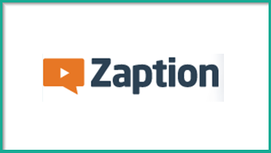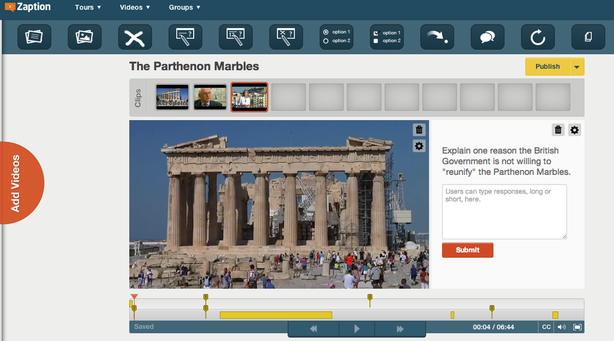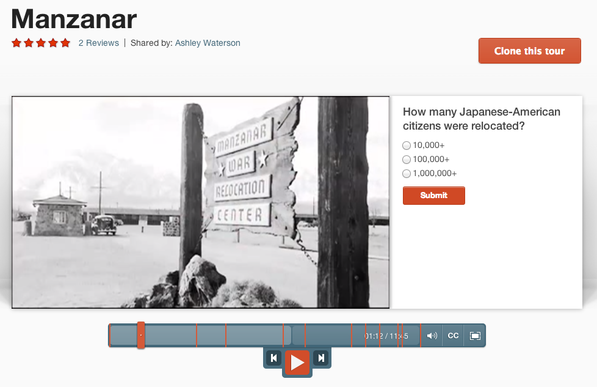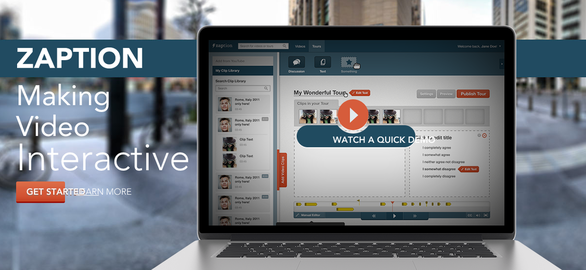
But as mountains of video pile up on YouTube, Vimeo, and private video libraries all over the world, it is becoming increasingly clear that just watching video by itself does not produce deep learning. Zaption enables teachers, online course providers, and curriculum publishers to easily turn existing videos into an engaging, interactive learning experience, complete with quizzes, live discussions and analytics for instructors.
Zaption was founded by father-son team Jim and Charlie Stigler. Charlie is one of Peter Thiel’s “20 Under 20” fellows who left the computer science program at Columbia University to start Zaption. The Thiel Fellowship brings together some of the world’s most creative and motivated young people, and helps them bring their most ambitious ideas and projects to life.
“YouTube is more than just cat videos,” says Charlie Stigler. “With Zaption any teacher can tap into all the great educational content online and quickly create video lessons that are more engaging and meaningful.”
Jim Stigler is an accomplished professor, researcher, author and entrepreneur. He is an associate dean at UCLA, co-founder of Startup UCLA, and led the video studies for TIMSS - the international project to compare math education. Jim is also the author of two popular education books, The Teaching Gap and The Learning Gap, and his previous company, LessonLab, was an early innovator in online video for education. LessonLab was acquired by Pearson in 2003.
“Video has exploded on the web, and everyone assumes that video will be an important part of education in the future,” says Jim Stigler. “But unless video can move from passive watching to active learning, its potential will not be realized. That’s where Zaption comes in. Our initial platform is just the beginning of our efforts to transform online learning. The company is committed to being at the forefront of research and innovation on how to maximize the power of video for learning.”
Zaption spent the summer in private beta and recently rolled-out a wide range of new features to improve the user experience for designers and learners. The company also just recently released its support for LTI - a software plugin that seamlessly integrates Zaption with learning management systems like Blackboard, Moodle, and Canvas.
Zaption’s initial focus is on three markets: K-12, higher education, and teacher learning. An early customer of Zaption in the teacher learning market is the Brandon Center Digital Archive at the University of Michigan. Lesli Scott, who directs the development of their video collections, says "Zaption is one of the most innovative tools we've seen for helping educators to analyze videos of classroom practice." Analysis of practice is increasingly seen as a key means of learning to teach better
Teachers in both K-12 and higher education already are finding creative uses for Zaption. Middle school English teacher Ashley Waterson spent her summer building Zaption learning tours and just rolled them out to students last week. “These are the same videos I used before, but the level of student engagement has gone way up with Zaption. Students love it, and they learn more,” said Ms. Waterson.
Zaption also is working on partnerships with education publishers to create and distribute libraries of Zaption-enhanced videos, aligned with curriculum standards, that can easily be used to improve student learning. The company plans to release an iPad friendly version of the app in the near future, making Zaption accessible to the growing number of classrooms embracing mobile learning.
Zaption offers a 30-day free trial for all educators - no credit card required - and recently launched a Zaption Pioneers program to help instructors create great tours and share them with other educators in Zaption’s private gallery (www.zaption.com/pioneers).
Zaption has wonderful classroom potential and in the coming weeks the Ed Tech Roundup will offer a complete review of the new service. Stay tuned for details.















